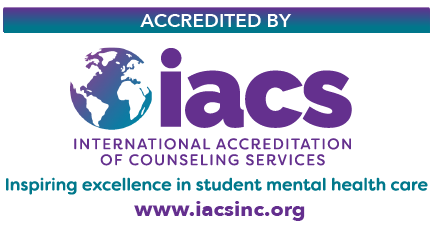Who is eligible to use the Counseling Center Services?
All enrolled Arkansas State University Jonesboro and NYIT Jonesboro students are eligible for services.
Do I have to pay for counseling center services?
No fee is charged to currently enrolled A-State students.
How are services provided?
The counseling center is able to provide services in-person or via a HIPPA compliant video call. Due to licensure restrictions, a student must be within the state of Arkansas at the time of service.
If I go to the counseling center, does it mean there is something wrong with me?
No, it does not; for the most part students who use our services are interested in their personal growth and adjustment to the world around them. Many students face normal personal and academic concerns while they are at A-State and, at times, they may feel anxious, angry, sad, or depressed. When these problems arise, as well as at times of crisis, it is helpful to spend time with an unbiased trained professional who can assist you in gaining a new perspective.
If I visit the counseling center, what kinds of records are kept and who has access to these records?
Counseling records are kept separate from academic, disciplinary and medical records to ensure student's privacy and confidentiality. All aspects of your participation in counseling at the Wilson Counseling Center including the scheduling of appointments, contents of counseling sessions, all contents of counseling records and outcomes of counseling are confidential by federal and state law. No information is released without the knowledge and written consent of the student except for those rare instances where clinicians are required by law or by court order to reveal particular information.
The law states that there are three situations that require a clinician to disclose information:
a) you may request (by means of a signed release) that your counselor may reveal information to other individuals or agencies of your choice;
b) in instances where there is imminent danger of serious harm to yourself or others, a counselor may reveal that information to prevent harm; and
c) in cases involving physical and/or sexual abuse of children or endangered adults, the counselor must report such abuse. In an emergency situation where students demonstrate a high probability of harming themselves or others, the staff may be required to release information to ensure safety.
How do I make an appointment with the counseling center?
In order to begin counseling, you must complete an initial intake. Click here for more information or contact us at 870-972-2318.
Are appointments needed to receive counseling center services?
In order to serve as many students as possible, we do require an appointment for most services. Students who are experiencing a mental health crisis or emergency can be seen without an appointment.
What can be expected during the first visit?
You will complete a brief informational form and will visit with a counselor who will listen to your concerns. Appropriate services will be determined based on this visit. Afterward, your counselor will follow up with you to set up further appointments.
What if I start feeling suicidal or as if I can't cope?
If you feel this way, please call or come to the Center and ask to speak with a counselor right away. If the Center is not open, call the University Police Department (972-2093). If a situation is imminently life threatening, call 911.
If I am concerned about one of my friends or someone I know, what can I do?
You can contact the Center and make an appointment to speak to a counselor about what you might do to help your friend or get your friend to see a counselor. If you think your friend is in a real crisis, call immediately. If the Center is not open, call the University Police Department (972-2093).







